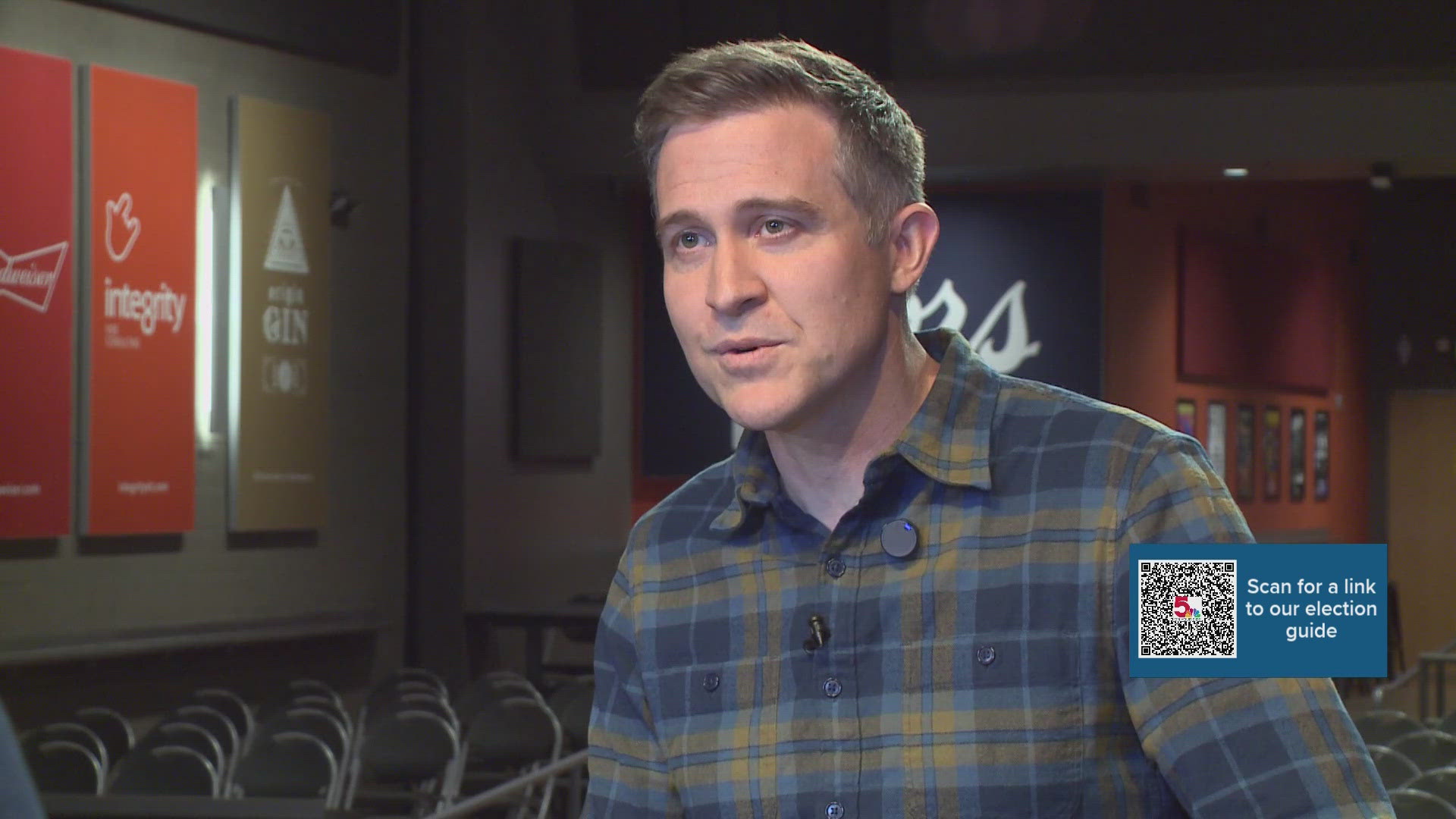ST. LOUIS — Trish Gunby is a Democratic candidate for U.S. House of Representatives in Missouri's Second Congressional District. The primary is August 2. One Democrat will go on to face candidates of other parties in the general election in November.
Missouri Rep. Gunby (D-99) is calling for a “new day” in Missouri’s Second Congressional District. She is pushing for a universal healthcare system that supports Americans and halts medical debt. She calls the Supreme Court's decision to overturn Roe V. Wade “disastrous.”
KNOW TO VOTE: Missouri primary 2022: Voter guide for St. Louis area
5 On Your Side candidate survey
To the extent any single member of Congress can influence the U.S. economy and labor market, what immediate steps would you take to reduce the cost of living burden Missourians face during this period of inflation?
Gunby: I think we are still coming to terms with the economy, given what's happened with COVID. We have supply chain issues. We still have COVID in our midst. We have workers who still haven't come back to work. And so I think corporations, governments are still managing that. It's obviously a global issue as well. It's not just inherent here in the United States. We see this globally. And so the hope would be things would catch up. Certainly, we need help when it comes to some of the pricing. And I would say that one of the ways we could do that, we've already seen some legislation that moves through at the congressional level in terms of helping people with gas price gouging, also helping with insulin prices. Those are things that many Republicans voted no on and Wagner voted no on. And so there have been sort of some smaller types of legislation packages that the government has said, hey, let's help where we can. Let's wait till the economy picks up and then we can kind of stabilize things.
Missouri state law prohibits women and girls from seeking abortion procedures at any time during their pregnancy, regardless of circumstances involving rape, incest, or other unwanted or unplanned pregnancies. Would you support a similar law at the federal level? If not, then which women or girls should be allowed access to safe, legal abortion procedures?
Gunby: I want to start off by saying that abortion is health care and the overturning of Roe v Wade. I never thought I would sit here in my sixties and say I have fewer rights now than I did when I was a teenager. So that is heartbreaking to me and makes me very angry. And one of the things that I would say is that government should not be involved in a person's health care that is between an individual and that person's health care provider. Government does not belong in an examining room or in an operating room. So that's the first thing I would say. The other thing I would say for states like Missouri who have restrictions in terms of no case, no no rape or incest as being part of the law. That is unconscionable to me. That is inhumane. The idea that we would force children, perhaps who have been subject to that trauma into a pregnancy, I can't even fathom that. So how are we going to deal with mental health issues, those sorts of things down the road? So I would just say that health care, abortion is health care and it should be between the person seeking that health care and the provider.
What specific policies or practices would you support from Congress that could directly improve safety and reduce violent crime in Missouri?
Gunby: I have advocated for gun storage legislation. I've done that at the state level and that seems to be very bipartisan, very common sense. I'm a common sense gun candidate. And so what we look for is things that both sides can agree on, but that has not advanced at the state level most recently. Many Republicans, including Ann Wagner, voted against the active shooter alert system. Also against the Domestic Terrorism Prevention Act. And so in light of you've already Buffalo, Highland Park, Illinois, Indiana, the mall that just happened the other day, I can't understand why we are not trying to reduce gun violence in those ways with that legislation. Of course, there were there was some legislation that came out of Congress most recently around all of this. I don't think it went far enough. It addresses background checks and it addresses red flag laws. But the real culprit that we need to come to terms with is assault weapons. And I believe law enforcement needs to be at the table to have those discussions because they're the ones that we see in the videos deciding how they're going to go up against somebody who is outgunned them. So that needs to happen.
What do you perceive as the single greatest threat to American democracy and how would you address it in Congress?
Gunby: I believe it has to do with voting rights. I was doing voting rights advocacy work before I ran for office. And the fact that there are many entities and individuals who suggest that we have fraudulent voting, election integrity, all the sorts of things that rallying cry, those types of cries, it's just not true. Frankly, we have seen secretaries of state across the country. We have seen our own election authorities tamp down that kind of language. And so when you hear that and then it suggests there are issues, and then we see state legislatures, Missouri, as an example, passing legislation that makes it harder to vote. What needs to happen on the federal level is we need to vote for the For The People Act and we need to vote for the John Lewis Voting Rights Advancement Act that shores up the Voting Rights Act from the 1960s and says we aren't going to let this type of legislation move forward at the state level. We're going to protect our elections. We have good elections. Our our election authorities have attested to that. And that's what we need to do at the federal level for the last 100 years.
To what extent do fossil fuels contribute to the changing climate? To what extent should Congressional action attempt to alter that trajectory?
Gunby: I think most people, I would hope, would agree that human activity in terms of the industrial revolution, carbon emissions, all of that that we've all experienced and we have enjoyed, it's having an effect on climate change. And certainly we. Don't have to see that. It's 100 and some odd degrees right now. It's not even August. Europe has a heat warning. We have wildfires burning across the globe. We have hurricanes. We have inclement weather that makes no sense in the middle of summer or winter. And so fossil fuels are the first step in kind of reacting to that. And one of the things we do is we tend to react to that. So what I would pledge is that we would become a leader in renewable energy and green technology. We don't want China to get ahead of us on that. It means jobs, good jobs, and we need to save our planet. And that would be a way to do it. So we need to absolutely take a stand and be proactive in that regard.
Public polling shows most Americans believe the U.S. Supreme Court has become too political. What reforms, if any, should Congress take to reshape or reimagine the makeup or behavior of the court?
Gunby: I think the minute that Justice Clarence Thomas, his wife, Jenny Thomas. Texted President Trump's chief of staff, Mark Meadows, and asked about January 6th. It became very apparent to many of us that the court was no longer apolitical as we had hoped it was. Furthermore, we have justices who now serve who during their nomination process. Indicated that they would keep Roe v Wade intact, and we have seen that undone. And they have also lifted up what is coming down the pike when it comes to elections, perhaps same sex marriage, birth control, a lot of different things that the vast majority of citizens in our country are in support of. And yet there's going to be an attempt to undo those things. So I would recommend, I would suggest and strongly support rethinking the court. What does that look like? Looking at term limits in terms of age. Certainly when this nation started, people weren't living into their eighties and nineties, and so maybe they would rethink that, looking at the numbers on the court and perhaps considering that. So I absolutely would support reform in whatever fashion would work best for, obviously, our country.
Which Constitutional amendment is your favorite and why?
Gunby: I think it's the one that hasn't been passed yet for me. I would say the 28th Amendment, the Equal Rights Amendment. I think we were really close a number of years ago, decades ago. I think women specifically, who would obviously be most affected by it, by the amendment, Equal Rights Amendment, and I actually had some legislation along these lines at the state level talking about equal pay based on gender. You know, gender would not matter. And I was told by Republicans that that was controversial. I think half of the population would disagree with that. And so I would love to see the Equal Rights Amendment ratified, especially given that many of us feel like our rights are under attack right now.
What is your favorite movie, most influential book, and go-to genre of music?
Gunby: I think in terms of movies, I'm not going to pick any one movie. I like holiday season, Christmas time and all the movies. My family we rewatch It's a Wonderful Life, Bishop's Wife, Holiday Inn all of those holiday movies that kind of puts you in the spirit of Christmas. So I would say that in terms of book, I remember when I was in college, I read the book by Rabbi Harold Kushner about how When Bad Things Happen to Good People and in terms of When Bad Things Happen to Good People, I think you're at that point in your life where you're kind of trying to figure out your place and some things you can control. And much of life is based on luck and circumstance, and it's more about how you react to that when it's thrown your way. I'm going to go with a road trip shuffle of seventies and eighties hits. I think that's my favorite.



